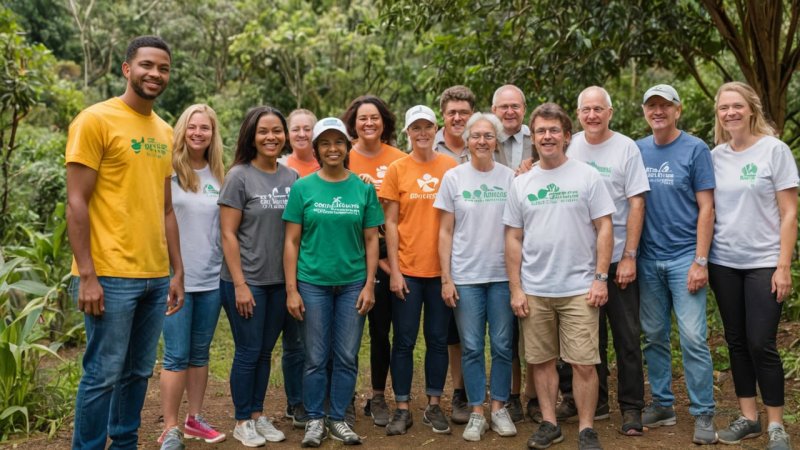Volunteer travel has become increasingly popular, allowing individuals to explore new cultures while contributing to meaningful causes. However, this rise in popularity has also led to a surge in scams targeting well-meaning travelers. Navigating the world of volunteer opportunities can be daunting, especially when so many organizations promise life-changing experiences that may turn out to be less than advertised. In this guide, we’ll delve into how to identify potential scams, understand the signs of legitimate volunteer programs, and ensure that your travel plans contribute positively to the communities you intend to serve.
Understanding Volunteer Travel Scams
Volunteer travel scams can take various forms, but they often share common characteristics. Scammers typically create attractive online listings for volunteer opportunities that feature beautiful images and engaging descriptions. They may promise volunteers experiences that include working with endangered species, teaching in exotic locales, or helping in disaster relief efforts. However, upon arrival, volunteers may find that the reality is far from what was promised.
Common Types of Scams
- Fake Organizations: Some scams involve organizations that don’t exist or operate purely to collect fees from volunteers without providing any meaningful service.
- Excessive Fees: Legitimate programs typically charge a reasonable fee to cover costs, but scammers may demand exorbitant sums that far exceed typical program fees.
- Misleading Information: Scammers often exaggerate the impact that volunteers will have, or they may misrepresent the nature of the work to be done.
- Poor Living Conditions: Once volunteers arrive, they may find that promised accommodations are substandard or non-existent.
Identifying Legitimate Volunteer Programs
To avoid scams, it’s crucial to know what to look for in a reputable volunteer program. Here are some tips to identify legitimate opportunities:
1. Research the Organization
Start by researching the organization online. Look for reviews on independent websites and check if they have a presence on social media. Reach out to former volunteers for their experiences. Legitimate organizations will often have a solid online footprint and a history of positive feedback.
2. Transparency in Operations
Reputable organizations will provide clear information about their projects, including details about the work involved, the community being served, and how funds are utilized. They should also be transparent about the fees charged and what they cover.
3. Accreditation and Partnerships
Check if the organization is accredited by relevant bodies or if they have partnerships with recognized NGOs. This can serve as a good indicator of their legitimacy and commitment to ethical practices.
4. Clear Communication
Legitimate organizations will engage in clear and open communication with potential volunteers. If an organization is evasive or fails to provide satisfactory answers to your questions, it may be a red flag.
Red Flags to Watch Out For
Even with thorough research, some scams may still slip through the cracks. Here are some additional red flags to watch for:
1. High Pressure Tactics
If an organization pushes you to sign up quickly or claims that spaces are limited, proceed with caution. Legitimate programs understand that volunteers need time to make informed decisions.
2. Lack of Local Presence
If the organization does not have a local office or contacts in the country where they operate, it could indicate a scam. A genuine organization will have local partnerships and staff to facilitate the program.
3. Unclear Payment Structures
Be wary of organizations that have vague or overly complex payment structures. Legitimate programs usually have straightforward fee breakdowns.
4. Negative Reviews
Pay attention to any negative reviews or warnings from past volunteers. If multiple sources mention the same issues, consider looking elsewhere.
Ensuring a Positive Volunteer Experience
Once you've identified a legitimate program and are ready to volunteer, there are steps you can take to ensure that your experience is rewarding and fulfilling:
1. Prepare Yourself
Before traveling, make sure to research the culture, customs, and language of the country you will be visiting. Understanding the local context will enhance your experience and help you connect more meaningfully with the community.
2. Set Realistic Expectations
While volunteering is often rewarding, it can also be challenging. Set realistic expectations about the impact you can make and be prepared for unforeseen difficulties.
3. Stay in Contact
Maintain regular communication with friends or family back home. This not only keeps them informed but can also provide you with a support system should any issues arise.
Conclusion
Volunteer travel can be a transformative experience, allowing you to contribute positively while exploring new regions of the world. However, it is essential to remain vigilant against scams that can tarnish this experience. By conducting thorough research, identifying red flags, and preparing adequately, you can ensure a meaningful and safe volunteer journey. Remember, the goal of volunteer travel is not only to give back but also to learn and grow through your experiences. With the right approach, you can make a difference in the lives of others while enriching your own.






